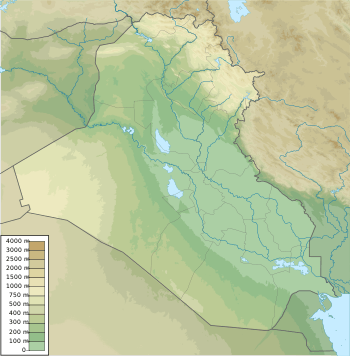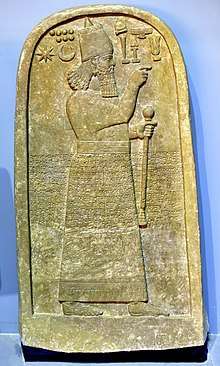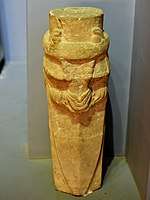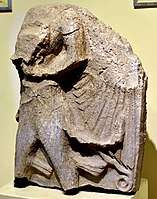Tell al-Rimah
Tell al-Rimah is a tell, or archaeological settlement mound, in Nineveh Province (Iraq). Its ancient name may have been either Karana or Qattara.[1] It is located in Nineveh Province (Iraq), roughly 80 kilometres (50 mi) west of Mosul and ancient Nineveh in the Sinjar region.
Qatara/Karana (?) | |
 Shown within Iraq | |
| Location | Nineveh Province, Iraq |
|---|---|
| Region | Mesopotamia |
| Coordinates | 36°15′25.51″N 42°26′57.61″E |
| Type | tell |
| Site notes | |
| Excavation dates | 1964–1971 |
| Archaeologists | D. Oates |
History of archaeological research
The region was originally surveyed by Seton Lloyd in 1938.[2] The site of Tell al-Rimah was excavated from 1964 to 1971 by a British School of Archaeology in Iraq team led by David Oates.[3][4][5][6][7][8] A large temple and palace from the early second millennium BCE were excavated, as well as a Neo-Assyrian building. Tell al-Rimah also is known for having a third millennium example of brick vaulting.[9]
Occupation history
While it appears that the site was occupied in the third millennium BCE, it reached its greatest size and prominence during the second millennium BCE and in the Neo-Assyrian period. The second millennium activity was primarily during the Old Babylonian and Mitanni periods. At various times, Tell al-Rimah has been linked with either Qatara or Karana, both cites known to be in that area during the second millennium.
Material culture
A number of Old Babylonian tablets contemporary with Zimri-Lim of Mari were found as well as other objects.[10][11][12] The most notable artifact found was the stele of Adad-nirari III which mentioned an early king of Northern Israel as "Jehoash the Samarian"[13][14] and contains the first cuneiform mention of Samaria by that name.[15]
Gallery
 Stele of Adad-nirari III from Tell al Rimah, discovered in 1967, now in the Iraq Museum in Baghdad
Stele of Adad-nirari III from Tell al Rimah, discovered in 1967, now in the Iraq Museum in Baghdad Marble column from Tell al-Rimah, Iraq, Neo-Assyrian period. Iraq Museum
Marble column from Tell al-Rimah, Iraq, Neo-Assyrian period. Iraq Museum Limestone relief of a male figure from Tell al-Rimah, Iraq. Kassite period. Iraq Museum
Limestone relief of a male figure from Tell al-Rimah, Iraq. Kassite period. Iraq Museum
See also
- Cities of the ancient Near East
- Short chronology timeline
References
- Mckee, G. "Places: 356369838 (Qattara?/Karana?)". Pleiades. Retrieved June 26, 2017.
- Seton Lloyd, Some Ancient Sites in the Sinjar district, Iraq, vol. 5, pp. 123ff, 1938
- David Oates, The Excavations at Tell al Rimah: 1964, Iraq, vol. 27, no. 2, pp. 62-68, 1965
- David Oates, The Excavations at Tell al Rimah, 1965, Iraq, vol. 28, no. 2, pp. 122-139, 1966
- David Oates, The Excavations at Tell al Rimah, 1966, Iraq, vol. 29, no. 2, pp. 70-96, 1967
- David Oates, The Excavations at Tell al Rimah: 1967, Iraq, vol. 30, no. 2, pp. 115-138, 1968
- David Oates, The Excavations at Tell al Rimah, 1968, Iraq, vol. 32, no. 1, pp. 1-26, 1970
- David Oates, The Excavations at Tell al Rimah: 1971, Iraq, vol. 34, no. 2, pp. 77-86, 1972
- Barbara Parker, Cylinder Seals from Tell al Rimah, Iraq, vol. 37, no. 1, pp. 21-38, 1975
- H. W. F. Saggs, The Tell al Rimah Tablets: 1965, Iraq, vol. 30, vo. 2, pp. 154-174, 1968
- D. J. Wiseman, The Tell al Rimah Tablets: 1966, Iraq, vol. 30, no. 2, pp. 175-205, 1968
- Stephanie Page, The Tablets from Tell Al-Rimah 1967: A Preliminary Report, Iraq, vol. 30, no. 1, pp. 87-97, 1968
- William H. Shea, Adad-Nirari III and Jehoash of Israel, Journal of Cuneiform Studies, vol. 30, no. 2, pp. 101-113, 1978
- Tell al-Rimah Stela (797 BCE): inscription by Assyrian king Adad-Nirari III, in which he describes his successes in the west. Livius.org. Quote: "...[4] I received 2,000 talents of silver, 1,000 talents of copper, 2,000 talents of iron, 3,000 linen garments with multicolored trim - the tribute of Mari' - of the land of Damascus. I received the tribute of Jehoash the Samarian, of the Tyrian ruler and of the Sidonian ruler."
- Page, Stephanie (1968). "A Stela of Adad-nirari III and Nergal-ereš from Tell al Rimah". Iraq. 30 (2): 139–153. doi:10.2307/4199848. JSTOR 4199848.
Further reading
- Carolyn Postgate, David Oates and Joan Oates, The Excavations at Tell al Rimah: The Pottery, Aris & Phillips, 1998, ISBN 0-85668-700-6
- Stephanie Dalley, C.B.F Walker and J.D. Hawkins. The Old Babylonian Tablets from Al-Rimah, British School of Archaeology in Iraq, 1976, ISBN 0-903472-03-1
- Stephanie Dalley, Mari and Karana: Two Old Babylonian Cities, Gorgias Press, 2002 ISBN 1-931956-02-2
- C. B. F. Walker, A Foundation-Inscription from Tell al Rimah, Iraq, vol. 32, no. 1, pp. 27–30, 1970
- J. N. Postgate, A Neo-Assyrian Tablet from Tell al Rimah, Iraq, vol. 32, no. 1, pp. 31–35, 1970
- Stephanie Dalley, Old Babylonian Trade in Textiles at Tell al Rimah, Iraq, vol. 39, no. 2, pp. 155–159, 1977
- Joan Oates, Late Assyrian Temple Furniture from Tell al Rimah, Iraq, vol. 36, no. 1/2, pp. 179–184, 1974
- Barbara Parker, Middle Assyrian Seal Impressions from Tell al Rimah, Iraq, vol. 39, no. 2, pp. 257–268, 1977
- Jesper Eidem, Some Remarks on the Iltani Archive from Tell al Rimah, Iraq, vol. 51, pp. 67–78, 1989